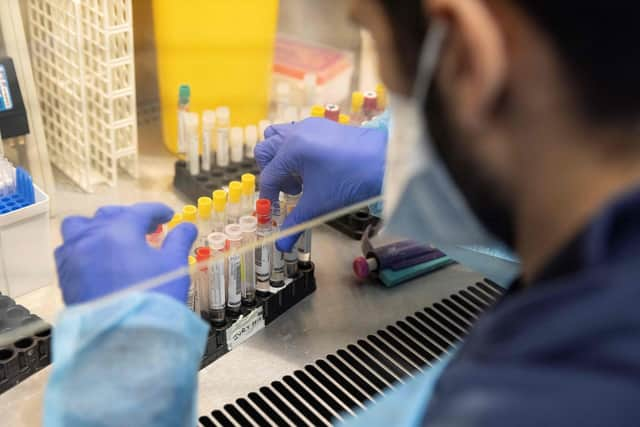Living with Covid-19: All restrictions end tomorrow - here's what it means
and live on Freeview channel 276
What it means:
The legal obligation to self-isolate will be lifted. However, as with many other infectious illnesses, public health guidance remains in place:
People who have tested positive are strongly advised to stay at home and avoid contact with others. Current guidance is available hereFully vaccinated close contacts of a positive person will no longer have to test for seven days, although it is still advisable to do so.


Advertisement
Hide AdAdvertisement
Hide AdUnvaccinated close contacts of a positive person will no longer be required to self-isolate
The financial support payments for self-isolation will come to an end, as will contact tracing.
Free Covid testing for all will end on April 1. The government will continue to provide free tests for people in the most at-risk groups. More details on this will come in the following days.
People over 75 or who are immunosuppressed will be eligible for an additional dose of the vaccine from the spring. More details will follow from the NHS.
Advertisement
Hide AdAdvertisement
Hide AdCoun Maureen Cummings, Wakefield Council’s Cabinet Member for Communities, Poverty and Health, said: “In light of the government announcement, which removed all remaining Covid-19 restrictions, this is an opportune time to express my thanks to residents and businesses for their hard work and personal sacrifice over the last two years.
“It is important as we all move forward and learn to live with Covid-19 that we remember those we have lost. They are forever in our hearts.
“We must not forget everything we’ve been through and how far we’ve come. Whilst welcome news to many, Covid-19 has not gone away, we still need to keep fighting by following public health measures.”
With this in mind, Wakefield Council encourages residents to be kind, be caring and be supportive of one another. This means respecting people’s personal choices, considering their own risk and taking responsibility to keep each other safe.
Advertisement
Hide AdAdvertisement
Hide AdVisitors are encouraged to wear a face-covering in Council buildings and to practise good hand hygiene when out and about.
Anna Hartley, Director of Public Health for the Wakefield district, said: “There were sadly four COVID-19 related deaths in local hospitals in the last week (up to 11 February) and our sympathies go out to the families, friends, and colleagues of those who have died.
“I urge everyone to be kind, be caring and be supportive by protecting those residents who remain more vulnerable to severe illness. Please do all you can to make those around you feel safe.
“We know that wearing a face-covering in indoor spaces, practising good hand hygiene and meeting in well ventilated places helps stop the transmission of COVID-19. I also want to remind people that if you’ve not had your jabs, please do so now – it’s the best way to protect yourself and others.”
Advertisement
Hide AdAdvertisement
Hide AdTo limit the spread of the virus, our advice to residents continues to be:
To have all doses of the vaccine, including boosters, without delay. There are a range of walk-in sessions available, find out more here.
If you are pregnant, it’s especially important you are fully vaccinated to protect yourself and your baby. Talk to your midwife if you need more information to make a decision.
If you are unwell with COVID-19 symptoms, stay at home, get tested and limit contact with other people. Follow current public health advice about how long to stay at home
Advertisement
Hide AdAdvertisement
Hide AdIf you feel unwell – please do not share your germs. Stay at home until you feel better.
To meet people outdoors or in well-ventilated places, and in smaller numbers.
To practise good hand hygiene – washing your hands with soap and water is one of the best ways to protect yourself from Covid-19 and other viruses.
To be caring by thinking of others by wearing a face-covering in all indoor public venues and on public transport.
Advertisement
Hide AdAdvertisement
Hide AdThere are currently 37 Covid-19 patients being cared for by The Mid Yorkshire Hospitals NHS Trust, compared to 44 the previous week.
Jo Webster, Chief Officer at NHS Wakefield Clinical Commissioning Group, said: “It’s still really important to make sure that you are fully vaccinated against COVID-19 as the vaccines have been shown to be highly effective at stopping people from becoming seriously ill or dying from Covid-19.
"Evidence also suggests that they help to prevent the virus spreading. For all the latest advice about COVID-19, please visit the NHS website.”
From Monday 21 February, mobile testing units will be based at the following locations:
Wakefield Sports and Social Club: 21 – 25 February.
Sacred Heart Catholic Church: 23 and 25 February.
Wakefield Trinity RLFC: 21, 22 and 24, 25 February.
More information about our testing offer can be found here.
Advertisement
Hide AdAdvertisement
Hide AdCase numbers and rates are becoming less accurate due to current testing practices.
It is likely that the case rate for Wakefield does not provide an accurate picture of the Covid-19 situation in the district with case numbers being under-reported.
The case rate is based on positive PCR tests and positive LFT tests where the result has been reported to the NHS.
This means that figures can be affected by how many people are taking tests and how many are choosing to report a positive result. More information on local and national case rates can be found here.